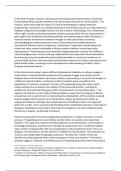In the field of media research, cultivating an intercultural partnership involves seamlessly
incorporating African wisdom traditions into the broader discourse on media studies. 1 For
instance, when examining the impact of cultural representation in global television
programming, researchers can collaboratively work with African scholars or media experts to
integrate indigenous knowledge systems into the research methodology. This collaborative
effort might include conducting interviews and focus groups within African communities to
gain insights into traditional storytelling methods and communication styles. Moreover, a
nuanced analysis of television narratives through an intercultural lens is essential,
acknowledging and respecting diverse ways of perceiving social reality beyond the
conventional Western-centric perspective. Furthermore, researchers should explore the
ethical and value systems embedded in African wisdom traditions concerning media
representation. Promoting open and respectful dialogue between scholars from different
cultural backgrounds is crucial, fostering collaborations that transcend cultural boundaries.
By embracing inclusive frameworks and avoiding monolithic or exclusivist tendencies in
current media theories, this intercultural partnership enhances the richness and relevance of
global media studies, ensuring a more comprehensive understanding of media's role in
shaping cultural perceptions.
In the intercultural context, where different philosophical traditions or cultures engage in
conversation, conversationalism emphasizes the ongoing struggle and creative tension
between thesis and anti-thesis. Each party, whether representing a rival school of thought or
a different cultural tradition, maintains its distinct position (nwa-nsa) without the
expectation of reaching a synthesis. The duty of the opposing party (nwa-nju) is not to
merge positions but to question the viability of the presented position, revealing its
weaknesses and creatively filling gaps within the framework of conversationalism. 2 The
rejection of synthesis in intercultural thinking implies a respect for the integrity of diverse
perspectives and a commitment to maintaining the individualities of the variables involved.
It acknowledges that the goal is not a harmonized, singular perspective but rather an
ongoing and dynamic exchange that perpetuates the reshuffling of ideas. This approach
allows for a richer, more nuanced understanding of the complexities inherent in intercultural
dialogues, fostering an environment where diverse viewpoints can coexist without being
forced into a singular, synthesized framework.
Mosima's proposal for intercultural philosophy emphasizes "creative innovation" and the
process of "negotiating one's own identity and the others in a jointly constructed new
situation." This approach, aimed at avoiding hegemonic and ethnocentric constructions in
knowledge production, prioritizes the exchange of perspectives over a traditional subject-
object model. Comparing this with conversationalism, both perspectives share a focus on
dialogue, communication, and the rejection of hegemonic constructions. They advocate for
inclusive and collaborative knowledge production. The idea that "neither of the two
identities has fully prepared either of the participants in that new situation" in Mosima's
proposal suggests a dynamic and flexible process of negotiating identity within intercultural
1 Pius, Mosima, "African Philosophy as Dialogue in Global Times: Towards an Intercultural Understanding of
African Philosophy," Filosofie & Praktijk 43, no. 3 (2022): 29.
2 Jonathan O. Chimakonam, "What Is Conversational Philosophy? A Prescription of a New Theory and Method
of Philosophising, in and Beyond African Philosophy," Phronimon 18 (2017): 121,





